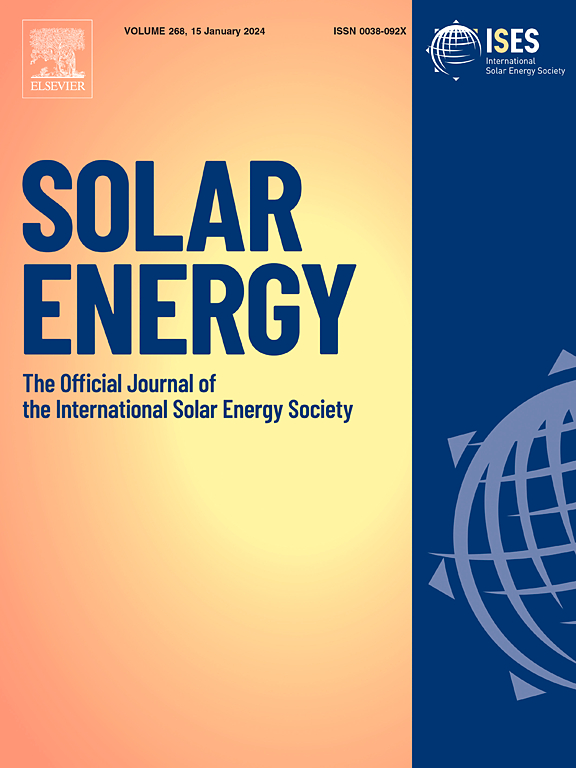A new form of solar photovoltaic-photothermal cascade conversion with multistage concentrating-spectrum splitting: thermodynamic discussion
IF 6
2区 工程技术
Q2 ENERGY & FUELS
引用次数: 0
Abstract
This study proposes a multi-stage concentrating and spectrum splitting strategy for full-spectrum solar energy photovoltaic–photothermal (PV–PT) coupling utilization. A thermophysical model is established to investigate the effect of concentration ratio on the photothermal conversion of spectrum beam radiation. The effectiveness of concentration ratio on improving the output work potential of different spectra are analyzed. Moreover, a single-stage spectral splitting PV–PT system is optimized, and the impact of concentration variation on system performance is evaluated. Two multi-stage system configurations are investigated: one using the residual spectrum for direct high-temperature conversion of isothermal endothermic processes such as thermophotovoltaics; and the other applying residual spectrum for cascade heating to drive thermal power or thermal chemical cycles. The results indicate that the increasing concentration ratio is beneficial for enhancing the thermal conversion capacity of long-wavelength solar radiation. For effective PV–PT coupling conversion, the concentration ratio should be decoupled for different spectra. The multi-stage system reduces the required concentration ratio by over 40% compared to a single-stage system, enabling simpler and more cost-effective optical designs. In addition, the system efficiency is theoretically comparable to or exceeding that of the optimal single-stage system. The two-stage system with concentration ratio of 600 can achieve an efficiency of over 54%, even exceeding that of the single-stage system with concentration ratio of 1000 (53.87%). A three-stage non-isothermal endothermic coupling system can achieve efficiencies near 55%. This study provides practical guidance for the development of high-efficiency full-spectrum solar energy PV-PT coupling conversion systems.
一种新形式的太阳能光电-光热级联转换多级集中-光谱分裂:热力学讨论
本研究提出了全光谱太阳能光伏-光热(PV-PT)耦合利用的多阶段聚光和分谱策略。建立了一个热物理模型,研究了浓度比对光谱光束光热转换的影响。分析了浓度比对提高不同光谱输出功势的有效性。对单级分光PV-PT系统进行了优化,并评估了浓度变化对系统性能的影响。研究了两种多级系统结构:一种是利用剩余光谱进行等温吸热过程(如热光伏)的直接高温转换;另一种是利用残余光谱进行串级加热,驱动热动力或热化学循环。结果表明,浓度比的增大有利于提高长波太阳辐射的热转换能力。为了实现有效的PV-PT耦合转换,不同光谱的浓度比必须解耦。与单级系统相比,多级系统将所需的浓度比降低了40%以上,使光学设计更简单,更具成本效益。此外,该系统的效率在理论上与最优单级系统相当或超过。浓度比为600的两级系统效率可达54%以上,甚至超过浓度比为1000的单级系统(53.87%)。三级非等温吸热耦合系统的效率接近55%。该研究为开发高效全光谱太阳能PV-PT耦合转换系统提供了实践指导。
本文章由计算机程序翻译,如有差异,请以英文原文为准。
求助全文
约1分钟内获得全文
求助全文
来源期刊

Solar Energy
工程技术-能源与燃料
CiteScore
13.90
自引率
9.00%
发文量
0
审稿时长
47 days
期刊介绍:
Solar Energy welcomes manuscripts presenting information not previously published in journals on any aspect of solar energy research, development, application, measurement or policy. The term "solar energy" in this context includes the indirect uses such as wind energy and biomass
 求助内容:
求助内容: 应助结果提醒方式:
应助结果提醒方式:


